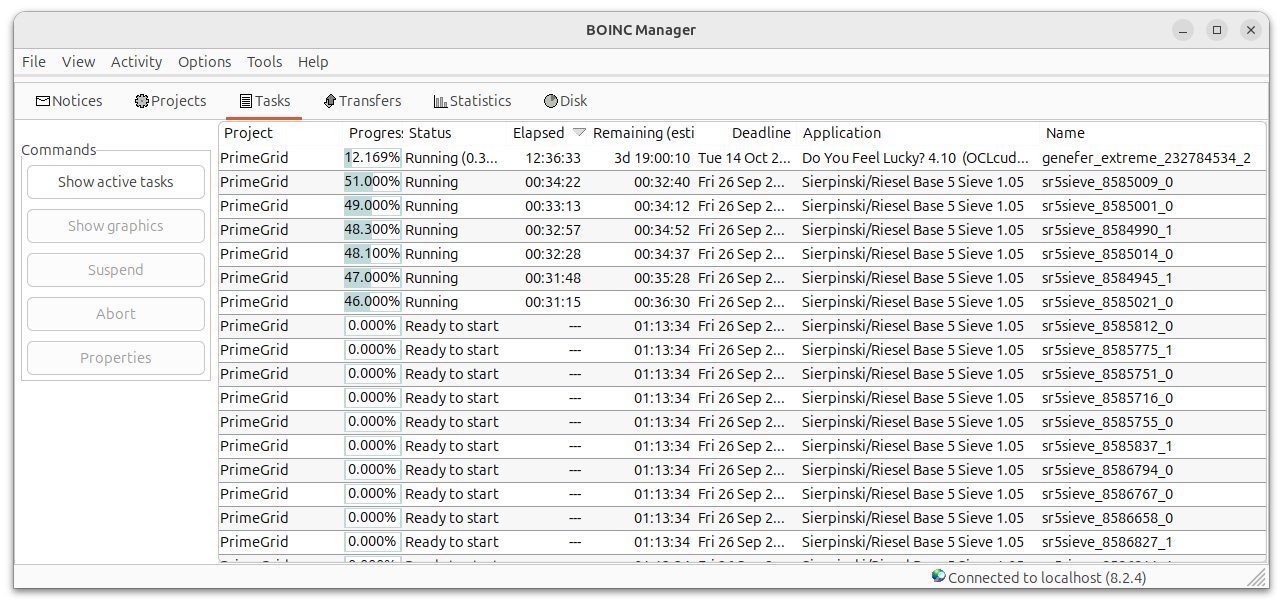
Published on 2025-10-02, 642 words
You may wonder what I’ve been busy doing since I had a kid? I’ve clearly been too busy to write blog posts. Among other exciting things, thanks to a tip from my brother, I’ve been looking for very large prime numbers on PrimeGrid!
More than 2000 years ago, Euclid proved that there an infinite number of prime numbers. Since then, mathematicians have not yet discovered an efficient universal formula to generate primes. Instead, finding large prime numbers mostly boils down to:
How do you figure out if a number is prime? Mathematicians have discovered many primality tests - formulas for checking whether a number is prime - but these formulas are still computationally-expensive. It wasn’t until the mid 20th century, with the development of electronic computers, that mathematicians were able to practically use primality tests on numbers much larger than a few dozen digits.
Fast forward to today. Many people who have an interest in mathematics also happen to have personal computers with powerful CPUs and GPUs. PrimeGrid is a way to distribute the search for prime numbers, running as smaller chunks of work across thousands of volunteers’ computers. Effectively, these thousands of computers around the world are coordinating with PrimeGrid to run a variety of primality tests against a long list of very large candidate numbers. (By “very large” - the smallest numbers in any of the 20 or so active PrimeGrid projects are on the GFN-16 subproject, “only” ~570,000 digits long. Other projects are looking for prime numbers that are many millions of digits long.)
When I run PrimeGrid on one of my computers, the client contacts one of PrimeGrid’s servers, which vends some work units to my computer according to the projects I’ve chosen to participate in. In this screenshot, my gaming PC is running one “genefer_extreme” job on its GPU and several single-threaded “SR5 Sieve” jobs on its 6-core CPU. There’s a list of uninitialized jobs, pre-downloaded to run later when the current batch of jobs finishes.

Large prime numbers were studied for more than a thousand years without any practical application beyond pure mathematics. Then, in the late 20th century, cryptographers discovered encryption algorithms such as RSA based on semi-prime keys, constructed by multiplying two moderately-large prime numbers together. RSA is a mathematical discovery that is critical to the modern Internet, built on top of hundreds of years of math; what was, at the time of its initial study, purely-theoretical math.
RSA typically uses prime numbers in the neighborhood of 2^1024 - that is, ~1000 binary digits, or about 300 base-ten digits. The prime numbers discovered by projects like PrimeGrid are orders of magnitude larger than that. They don’t have any practical applications today. But, maybe over the next 10 or 100 or 1000 years, mathematicians will discover interesting math culminating in some future application we can’t even think of - and it all started with a bunch of people in the early 21st century running PrimeGrid on their computers…
Since I started running PrimeGrid in August, I’ve found one prime number,
361467126131072+1, which is 1,121,724 digits long.
At the time of discovery, this was the 1156th largest known prime number. (As of writing this post,
9 larger prime numbers have since been discovered!)
Along the way, my computers have also contributed negative results. I’ve helped prove that 12,000+ other numbers are not prime.
Besides the glory of finding prime numbers, PrimeGrid has gamification; you earn “credits” for each task, with achievement badges. For example, I recently earned this 22x22-pixel Ruby badge for my contributions to the Compositorial Prime Search.

BOINC has a variety of other projects besides PrimeGrid. Maybe you’ll find something worth wasting electricity on!